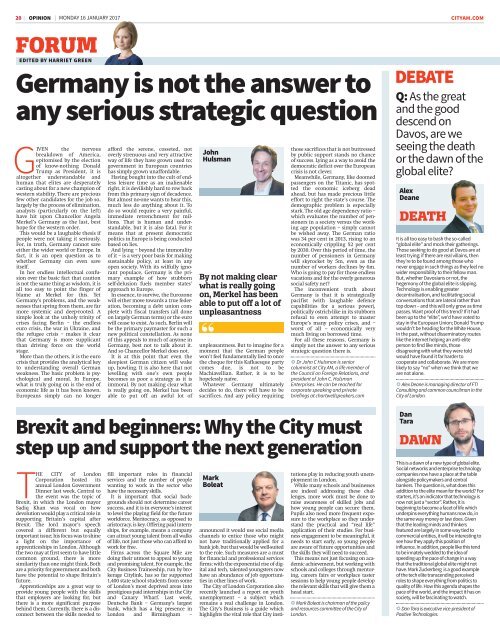TO NEW BREXIT REALITY
cityam-2017-01-16-587c21ea87f30
cityam-2017-01-16-587c21ea87f30
You also want an ePaper? Increase the reach of your titles
YUMPU automatically turns print PDFs into web optimized ePapers that Google loves.
20 OPINION MONDAY 16 JANUARY 2017<br />
CITYAM.COM<br />
FORUM<br />
EDITED BY HARRIET GREEN<br />
Germany is not the answer to<br />
any serious strategic question<br />
GIVEN the nervous<br />
breakdown of America,<br />
epitomised by the election<br />
of know-nothing Donald<br />
Trump as President, it is<br />
altogether understandable and<br />
human that elites are desperately<br />
casting about for a new champion of<br />
western stability. There are precious<br />
few other candidates for the job so,<br />
largely by the process of elimination,<br />
analysts (particularly on the left)<br />
have hit upon Chancellor Angela<br />
Merkel’s Germany as the last, best<br />
hope for the western order.<br />
This would be a laughable thesis if<br />
people were not taking it seriously.<br />
For, in truth, Germany cannot save<br />
either the wider world or Europe. In<br />
fact, it is an open question as to<br />
whether Germany can even save<br />
itself.<br />
In her endless intellectual confusion<br />
over the basic fact that caution<br />
is not the same thing as wisdom, it is<br />
all too easy to point the finger of<br />
blame at Merkel for this. Yet<br />
Germany’s problems, and the weaknesses<br />
that spring from them, are far<br />
more systemic and deep-rooted. A<br />
simple look at the unholy trinity of<br />
crises facing Berlin – the endless<br />
euro crisis, the war in Ukraine, and<br />
the refugee crisis – makes it clear<br />
that Germany is more supplicant<br />
than driving force on the world<br />
stage.<br />
More than the others, it is the euro<br />
crisis that provides the analytical key<br />
to understanding overall German<br />
weakness. The basic problem is psychological<br />
and moral. In Europe,<br />
what is truly going on is the end of<br />
economic life as it has been known.<br />
Europeans simply can no longer<br />
THE CITY of London<br />
Corporation hosted its<br />
annual London Government<br />
Dinner last week. Central to<br />
the event was the topic of<br />
Brexit, in which the London mayor<br />
Sadiq Khan was vocal on how<br />
devolution would play a critical role in<br />
supporting Britain’s capital after<br />
Brexit. The lord mayor’s speech<br />
covered a different but equally<br />
important issue; his focus was to shine<br />
a light on the importance of<br />
apprenticeships in London. Although<br />
the two may at first seem to have little<br />
common ground, there is more<br />
similarity than one might think. Both<br />
are a priority for government and both<br />
have the potential to shape Britain’s<br />
future.<br />
Apprenticeships are a great way to<br />
provide young people with the skills<br />
that employers are looking for, but<br />
there is a more significant purpose<br />
behind them. Currently, there is a disconnect<br />
between the skills needed to<br />
afford the serene, cosseted, not<br />
overly strenuous and very attractive<br />
way of life they have grown used to;<br />
government in European countries<br />
has simply grown unaffordable.<br />
Having bought into the cult of endless<br />
leisure time as an inalienable<br />
right, it is devilishly hard to row back<br />
from this primary sign of decadence.<br />
But almost no-one wants to hear this,<br />
much less do anything about it. To<br />
do so would require a very painful,<br />
immediate retrenchment for millions.<br />
That is human and understandable,<br />
but it is also fatal. For it<br />
means that at present democratic<br />
politics in Europe is being conducted<br />
based on lies.<br />
And lying – beyond the immorality<br />
of it – is a very poor basis for making<br />
sustainable policy, at least in any<br />
open society. With its wilfully ignorant<br />
populace, Germany is the primary<br />
example of how stubborn<br />
self-delusion fuels member states’<br />
approach to Europe.<br />
In essence, to survive, the Eurozone<br />
will either move towards a true federation,<br />
becoming a debt union complete<br />
with fiscal transfers (all done<br />
on largely German terms) or the euro<br />
will cease to exist. As such, Berlin will<br />
be the primary paymaster for such a<br />
new political constellation. As none<br />
of this appeals to much of anyone in<br />
Germany, best not to talk about it.<br />
And so Chancellor Merkel does not.<br />
It is at this point that even the<br />
sleepiest German citizen will wake<br />
up, howling. It is also here that not<br />
levelling with one’s own people<br />
becomes as poor a strategy as it is<br />
immoral. By not making clear what<br />
is really going on, Merkel has been<br />
able to put off an awful lot of<br />
fill important roles in financial<br />
services and the number of people<br />
wanting to work in the sector who<br />
have the necessary skills.<br />
It is important that social backgrounds<br />
should not determine career<br />
success, and it is in everyone’s interest<br />
to level the playing field for the future<br />
workforce. Meritocracy, as opposed to<br />
aristocracy, is key. Offering paid internships,<br />
for example, means a company<br />
can attract young talent from all walks<br />
of life, not just those who can afford to<br />
work for free.<br />
Firms across the Square Mile are<br />
doing their utmost to appeal to young<br />
and promising talent. For example, the<br />
City Business Traineeship, run by brokerage<br />
Citylink, has so far supported<br />
1,400 state school students from some<br />
of London’s most deprived areas into<br />
prestigious paid internships in the City<br />
and Canary Wharf. Last week,<br />
Deutsche Bank – Germany’s largest<br />
bank, which has a big presence in<br />
London and Birmingham –<br />
John<br />
Hulsman<br />
By not making clear<br />
what is really going<br />
on, Merkel has been<br />
able to put off a lot of<br />
unpleasantness<br />
unpleasantness. But to imagine for a<br />
moment that the German people<br />
won’t feel fundamentally lied to once<br />
the cheque for this Kafkaesque party<br />
comes due, is not to be<br />
Machiavellian. Rather, it is to be<br />
hopelessly naïve.<br />
Whatever Germany ultimately<br />
decides to do, there will have to be<br />
sacrifices. And any policy requiring<br />
those sacrifices that is not buttressed<br />
by public support stands no chance<br />
of success. Lying as a way to avoid the<br />
democratic deficit over the European<br />
crisis is not clever.<br />
Meanwhile, Germany, like doomed<br />
passengers on the Titanic, has spotted<br />
the economic iceberg dead<br />
ahead, but has made precious little<br />
effort to right the state’s course. The<br />
demographic problem is especially<br />
stark. The old age dependency ratio –<br />
which evaluates the number of pensioners<br />
in a society versus the working<br />
age population – simply cannot<br />
be wished away. The German ratio<br />
was 34 per cent in 2013, rising to an<br />
economically crippling 52 per cent<br />
by 2030. Over this period of time, the<br />
number of pensioners in Germany<br />
will skyrocket by 5m, even as the<br />
number of workers declines by 6m.<br />
Who is going to pay for those endless<br />
vacations and for the overly generous<br />
social safety net?<br />
The inconvenient truth about<br />
Germany is that it is strategically<br />
pacifist (with laughable defence<br />
capabilities for a serious power),<br />
politically ostrich-like in its stubborn<br />
refusal to even attempt to master<br />
Europe’s many policy crises, and –<br />
worst of all – economically very<br />
much living on borrowed time.<br />
For all these reasons, Germany is<br />
simply not the answer to any serious<br />
strategic question there is.<br />
£ Dr John C Hulsman is senior<br />
columnist at City AM, a life member of<br />
the Council on Foreign Relations, and<br />
president of John C. Hulsman<br />
Enterprises. He can be reached for<br />
corporate speaking and private<br />
briefings at chartwellspeakers.com<br />
Brexit and beginners: Why the City must<br />
step up and support the next generation<br />
Mark<br />
Boleat<br />
announced it would use social media<br />
channels to entice those who might<br />
not have traditionally applied for a<br />
bank job, but that would be well-suited<br />
to the role. Such measures are a must<br />
for financial and professional services<br />
firms: with the exponential rise of digital<br />
and tech, talented youngsters now<br />
have an abundance of job opportunities<br />
in other lines of work.<br />
The City of London Corporation also<br />
recently launched a report on youth<br />
unemployment – a subject which<br />
remains a real challenge in London.<br />
The City’s Business is a guide which<br />
highlights the vital role that City institutions<br />
play in reducing youth unemployment<br />
in London.<br />
While many schools and businesses<br />
are indeed addressing these challenges,<br />
more work must be done to<br />
raise awareness of skilled jobs and<br />
how young people can secure them.<br />
Pupils also need more frequent exposure<br />
to the workplace so they understand<br />
the practical and “real life”<br />
application of their studies. For business<br />
engagement to be meaningful, it<br />
needs to start early, so young people<br />
are aware of future opportunities and<br />
the skills they will need to succeed.<br />
This means not just focusing on academic<br />
achievement, but working with<br />
schools and colleges through mentoring,<br />
careers fairs or workplace taster<br />
sessions to help young people develop<br />
the relevant skills that will give them a<br />
head start.<br />
£ Mark Boleat is chairman of the policy<br />
and resources committee of the City of<br />
London.<br />
DEBATE<br />
Q: As the great<br />
and the good<br />
descend on<br />
Davos, are we<br />
seeing the death<br />
or the dawn of the<br />
global elite?<br />
Alex<br />
Deane<br />
DEATH<br />
It is all too easy to bash the so-called<br />
“global elite” and mock their gatherings.<br />
Those seeking to do good at Davos are at<br />
least trying; if there are real villains, then<br />
they’re to be found among those who<br />
never engage in such things as they feel no<br />
wider responsibility to their fellow man.<br />
But, whether Davosians or not, the<br />
hegemony of the global elite is slipping.<br />
Technology is enabling greater<br />
decentralisation, and facilitating social<br />
conversations that are lateral rather than<br />
top down – and this will only grow as time<br />
passes. Want proof of this trend? If it had<br />
been up to the “elite”, we’d have voted to<br />
stay in the European Union; Donald Trump<br />
wouldn’t be heading for the White House.<br />
In the past, without disseminatory routes<br />
like the internet helping an anti-elite<br />
person to find like minds, those<br />
disagreeing with what they were told<br />
would have found it far harder to<br />
cooperate and collaborate. We are more<br />
likely to say “no” when we think that we<br />
are not alone.<br />
£ Alex Deane is managing director of FTI<br />
Consulting and common councilman in the<br />
City of London.<br />
Dan<br />
Tara<br />
DAWN<br />
This is a dawn of a new type of global elite.<br />
Social networks and enterprise technology<br />
companies now have a place at the table<br />
alongside policymakers and central<br />
bankers. The question is, what does this<br />
addition to the elite mean for the world? For<br />
starters, it’s an indicator that technology is<br />
now not just a “sector”. Rather, it is<br />
beginning to become a facet of life which<br />
underpins everything humans now do, in<br />
the same way money or law does. Given<br />
that the leading minds and thinkers<br />
featured are largely in some way tied to<br />
commercial entities, it will be interesting to<br />
see how they apply this position of<br />
influence. In addition, people like this tend<br />
to be innately wedded to the idea of<br />
speeding up the pace of change in a way<br />
that the traditional global elite might not<br />
have. Mark Zuckerberg is a good example<br />
of the tech elite transcending perceived<br />
roles to shape everything from politics to<br />
quality of life. How this agenda shapes the<br />
pace of the world, and the impact it has on<br />
society, will be fascinating to watch.<br />
£ Dan Tara is executive vice-president of<br />
Positive Technologies.
















